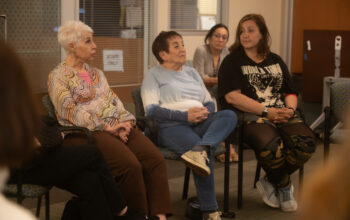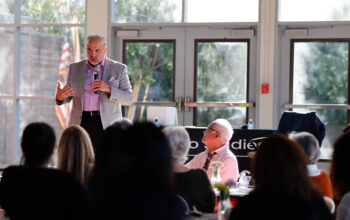Latinas forced to be sterilized during labor in Los Angeles 40 to 50 years ago sparked passionate discussion in the Great Hall on March 23 on the need for women to make informed decisions on their reproductive health.
In celebration of Women’s History Month, a documentary screening of ‘No Mas Bebes’ was organized by Sheryl Nomelli, assistant professor of History and the student group Blatigenous, which is a progressive social justice group on campus who focuses on minorities.
The film chronicles the court case of Madrigal v. Quilligan in which 10 Latino women argued they were coerced into signing paperwork, often in a language they did not speak, that unwittingly resulted in their tubes being tied while receiving cesarean sections at Los Angeles County+USC Medical Center in the 1960s and ‘70s. Doctors made the decision for them that they as a community were reproducing at too high of a rate and should not have more children, according to the documentary.
“Minority groups are targeted because they are seen as people who are takers in society, rather than people who give back,” Nomelli said.
In the book ‘Eugenic Nation: Faults and Frontiers of Better Breeding in Modern America’ author Alexandra Stern writes that nearly a third of all involuntary sterilizations in the United States from 1909 to 1979 occurred in California. This is in part because the procedures were funded by federal agencies beginning in 1909 and it was used as a means of birth control for the poor and to reduce strain on the state’s budget, according to Stern.
In the panel discussion that followed the movie, audience members opened up about their own experiences. Scarleth Barragan, a Nursing major, said her husband recommended that she have tubal ligation while she suffered through two days of labor with her second child.
“My doctor told him, this is not the time for her to decide that. Why don’t I tie yours,” Barragan said.
Barragan followed her doctor’s advice but said her husband responded “I cannot do that because I will lose my manhood.” She went on that women need to know that they are in charge of their own bodies, their rights and that they matter.
“I have a daughter,” Barragan said. “I don’t want her to ever think that she is less important than anyone else. We need to make sure that that message gets across so we can all have equal opportunities.”
English major Erika Garnier spoke of her fight with cancer and having a hysterectomy without being properly informed by doctors on her condition or options. In tears, she said she had it out of fear and did not fully think it through.
“I regret having a hysterectomy when I think back to it now,” Garnier said. “I didn’t give myself the chance to really make a proper decision and I regret that. I don’t have any children and I always wanted to have them”
Panelist Rene Parades, Public Health major and a member of Blatigenous, said it was a goal to shed light on minority women by showing ‘No Mas Bebes’.
“Instead of focusing on the typical portrayal of women in history as white women, [Blatigenous wanted to bring] different faces into it and talk about different communities of people who deserve the same kind of recognition and what they have been through,” Parades said.
The only male on the panelist, Joe Hernandez, International Development Studies, said as a Latino he was able to relate to the film.
“In Latino culture family is beyond anything,” Hernandez said. “Even when I’m down and out, I know I can go to my mom’s house and it brought up a lot of mixed emotions. In one particular scene you saw the son, and you saw as the mother was explaining to him [being sterilized], you could see it in his eyes, this rage, just this passion of how can you do this to my mother.“
Garnier said these stories of injustices on women of color and minorities in general need to be known by everybody. She believes they are suppressed because a lot of the white community does not view them as being important.
“I want to take a part of my life to take stories like this, and slavery and Native Americans, all these horrible things that were done, to make it a part of my life, to bring these stories to light,” Garnier said.
Nomelli echoed the need for people to be aware of the flaws of our past earlier in the discussion.
“Learning about our history is the first step in making sure we don’t repeat some of those mistakes,” Nomelli said.
The women did not win their case against the doctors at the LAC+USC Medical Center. Judge Jesse Curtis ruled that the doctors had their patient’s best interest in mind and that it was not objectionable for them to believe they were treating a perceived overpopulation problem, according to Stern. However, the case did result in changes including forms being made available to patients in multiple languages.
In 1927 Buck v. Bell The Supreme Court ruled that permitting the sterilization of the unfit including the disabled did not violate due process in the 14th amendment of the Constitution. History Professor Brian Walsh said The Supreme Court has never overturned this case and since eugenics is not occurring in the United States anymore there will probably never be an opportunity to overturn it.
“It is very unsettling when you look at it because you think that can’t happen again,” Walsh said. “The door is still open. It is always something to bear in mind.”


